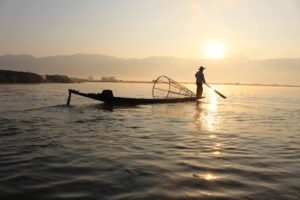Different Pools, Different Fish: The Mistake of ‘One Size Fits All’ Solutions to the Challenge of Effective Outreach Among Muslims
Posted 01/18/2017 in Reflections on Islam
“Different fields have different grasshoppers; different pools have different fish.” The wisdom of this Indonesian proverb has often been missed in discussions about Islam and how best to present a useful gospel witness to Muslims. Even many people wholeheartedly committed to reaching Muslims have made the mistake of treating Islam as a monolithic system and proposing “one size fits all” solutions to the challenge of effective outreach among Muslims.

In the Bridging the Divide network, through numerous case studies from scholar-practitioners with a wide range of perspectives and experiences, we have learned of the incredible diversity of contexts within “the Muslim world.” We have noted not only differences of social and political contexts, but also of diverse spiritual alignments and experiences among Muslims. Within these very different contexts, God is working in a variety of creative ways to shine the light of the gospel.
One recurring problem has been outsiders entering a ministry location with presuppositions about which contextual approach is best and what a contextual Christ-following fellowship should look like. Contextual presuppositions by cultural outsiders have spawned myriad and heated debates about the “best,” “most effective,” and/or most “biblical” approach to contextualization within Islamic contexts.
Too often those affected most negatively by these debates are the local people in Muslim-majority contexts. Christian minorities have sometimes felt ignored, sidelined, or damaged by the creative application of new contextual theories in their homeland. I once heard an Asian Christian express resentment that local people were being used as “guinea pigs” for contextual experiments, in a foreigner’s research to get a PhD.
Not only local Christians but also Muslims who come to follow Christ can be disadvantaged by well-meaning contextual preferences of those who bring the gospel. Gospel-bearers may bring with them a clear vision of how the fruit of their labor will look. While this can help in some ways, it has proven problematic in others. New believers can easily feel pressured by the subtle (or not-so-subtle) contextual preferences of those who have brought them the gospel.
 To avoid this conundrum, David Watson proposes that outsiders not do contextualization. He recommends that disciple-makers “deculturalize, not contextualize, the gospel” (the title of Chapter 2 of his book Contagious Disciple-Making). He elaborates: “The best way to do this is to use only Scripture for curricula, and allow local people to answer questions about Scripture, not listen to our answers” (p. 14–15). Contextualization, then, should be done by those coming to faith within a culture, as they ask themselves and one another: “What must we change in our lives and culture in order to be obedient to all the commands of Christ?” (ibid, p. 17) Outsiders can suggest relevant passages for study and provide outside mentoring for the group facilitator. But the onus of application is on the cultural insiders.
To avoid this conundrum, David Watson proposes that outsiders not do contextualization. He recommends that disciple-makers “deculturalize, not contextualize, the gospel” (the title of Chapter 2 of his book Contagious Disciple-Making). He elaborates: “The best way to do this is to use only Scripture for curricula, and allow local people to answer questions about Scripture, not listen to our answers” (p. 14–15). Contextualization, then, should be done by those coming to faith within a culture, as they ask themselves and one another: “What must we change in our lives and culture in order to be obedient to all the commands of Christ?” (ibid, p. 17) Outsiders can suggest relevant passages for study and provide outside mentoring for the group facilitator. But the onus of application is on the cultural insiders.
A good response to wide diversity among Muslims is this “discovery” (Disciple-Making Movement) approach, in which those coming to faith within any local context discover and obey relevant applications of God’s Word for themselves and their group.
Different pools have different fish. “Come, follow me,” Jesus said, “and I will send you out to fish for people” (Matthew 4:19).
L. D. Waterman (pseudonym) is an encourager of church planting movements among unreached groups, serving with Beyond. After ten years of pastoral ministry in the US he moved to Southeast Asia, where he has served since 1993. He has been a part of Bridging the Divide’s Facilitation Team since the network was launched in 2011.

